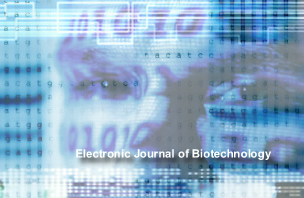
|
Electronic Journal of Biotechnology
Universidad Católica de Valparaíso
ISSN: 0717-3458
Vol. 30, No. 1, 2017, pp. 118-124
|
 Bioline Code: ej17086
Bioline Code: ej17086
Full paper language: English
Document type: Research Article
Document available free of charge
|
|
|
Electronic Journal of Biotechnology, Vol. 30, No. 1, 2017, pp. 118-124
| en |
RecET recombination system driving chromosomal target gene replacement in Zymomonas mobilis 
Wu, Yan; Li, Tao; Cao, Qinghua; Li, Xuedan; Zhang, Yizheng & Tan, Xuemei
Abstract
Background: Zymomonas mobilis is a Gram-negative microaerophilic bacterium with excellent ethanol-producing
capabilities. The RecET recombination system provides an efficient tool for direct targeting of genes in the
bacterial chromosome by PCR fragments.
Results: The plasmids pSUZM2a-RecET and pSUZM2a-RecE588T were first developed to co-express RecE or
RecE588 and RecT for homologous recombination. Thereafter, the PCR fragments of the tetracycline resistance
marker gene flanked by 60 bp of adhA (alcohol dehydrogenase I) or adhB (alcohol dehydrogenase II)
homologous sequences were electroporated directly into ZM4 cells harboring pSUZM2a-RecET or
pSUZM2a-RecE588T. Both adhA and adhB were replaced by the tetracycline resistance gene in ZM4, yielding
two mutant strains, Z. mobilis ZM4 ΔadhA and Z. mobilis ZM4 ΔadhB. These two mutants showed varying
extent of reduction in ethanol production, biomass generation, and glucose metabolism. Furthermore, enzyme
activity of alcohol dehydrogenase II in Z. mobilis ZM4 ΔadhB exhibited a significant reduction compared to that
of wild-type ZM4.
Conclusion: This approach provided a simple and useful method for introducing mutations and heterologous
genes in the Z. mobilis genome.
Keywords
Dehydrogenase gene; Electroporation; Ethanol; Genetic manipulation; Gram negative; Industrial applications; Knock-out; Primer; Production; Recombination; Vector
|
| |
© Copyright 2017 - Pontificia Universidad Católica de Valparaíso
Alternative site location: http://www.ejbiotechnology.info
|
|
